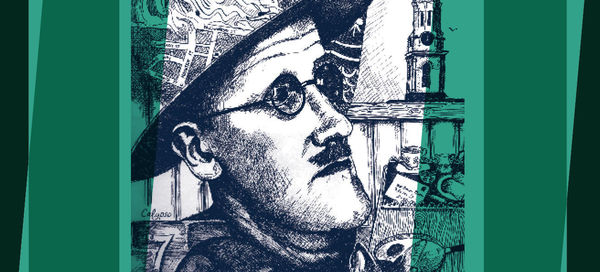

No book has been more explosive on impact than James Joyce's Ulysses. In destroying old forms, it created other, newer ones. In the words of Joyce’s biographer Richard Ellmann, we are still learning how to be its contemporaries—nearly 100 years after its writing.
Declan Kiberd
As we approach the 100th anniversary of the publication of James Joyce's Ulysses (February 2, 1922), the Keough-Naughton Institute has worked with its distinguished faculty fellows and many partners to create a year called "Global Ulysses."
The “global” in our title contains multiple meanings. While Ulysses so perfectly memorializes the Irish capital of Dublin, the book was conceived and written primarily in Italy and first published in France. More importantly, this great work has had a truly global impact, as has, in our 21st century, Irish Studies.
Two of our Institute faculty fellows, Declan Kiberd, the Donald and Marilyn Keough Professor of Irish Studies, Professor of English and Irish Language and Literature, and Barry McCrea, the Donald R. Keough Family Professor of Irish Studies and Professor of English, Irish Language and Literature, and Romance Languages and Literatures, are world-renowned Joyce scholars.
Joining with them in the Global Ulysses endeavor are Enrico Terrinoni, Full Professor Chair of English Literature at Università Per Stranieri di Perugia and President of the James Joyce Italian Foundation, who visited Notre Dame in Fall 2019, and Clíona Ní Ríordáin, Professor of English at the University Sorbonne Nouvelle-Paris 3, and a visitor to the Institute in Fall 2018.
At times individually and other times together, these faculty members taught the book in undergraduate and graduate seminars at Notre Dame's campus, at O'Connell House in Dublin, and to student and community reading groups in Paris. The Institute also invited speakers and performers to campus for our Fall 2019 Speakers Series to further develop Ulysses themes.
Central to the endeavor are three conferences in the cities in which Joyce lived and worked: Rome, Paris, and Dublin. Details for all three conferences are provided in our Global Ulysses website.
And, critical to the conferences and the entire Global Ulysses enterprise is the inclusion of not only academic Joyceans but speakers who have an expertise in subjects treated in the book but no particular fame as Joyce scholars--with their charge to apply the insights of their disciplines in a personal reading of a chapter appropriate to their field of knowledge. Thus, the Pulitzer-Prize winning novelist Jhumpa Lahiri will explore themes of the writer-in-exile in Rome; the playwright Marina Carr will delve into the "Penelope" chapter in Paris and Dublin, and the journalist Lara Marlowe will address themes of the "Aeolus" chapter in Paris.
A note from Declan Kiberd on the significance of Ulysses:
James Joyce’s Ulysses (1922) is widely considered to be the most important book of the 20th century. The novel announced a new era of modernity in art, celebrating the human body and centralising the processes of the mind. Written during some years of World War I, it replaced themes of the bravery of the soldier going to battle with the intrepidity of a person with courage to enter the abyss of his or her own self. For the first time in a major work of literature, the usual demands of plot were replaced by a passion for thinking. And the process of thought was perfectly calibrated to walks through the streets of the City of Dublin by its major characters, Stephen Dedalus and Leopold Bloom. Their wanderings replicate those of Homer’s protagonist in The Odyssey, whose Ulysses went so far from home that all the knowledge he brought back led to a reparadigming of culture.
In the same way, James Joyce’s Ulysses has led to a radical revision of what literature is and can do. Here we have Everyman as an artist of the Everyday. Soliloquies and monologues, once thought the preserve of aristocrats, are now possible to ordinary people doing nothing more momentous than taking a cup of tea or buying a bar of soap; yet, in the very littleness of humans, Joyce finds the basis of our greatness. Ulysses completely democratised the form of the novel, even as it made the act of reading more difficult and challenging. It had a massive influence on practitioners of the form in South America (Gabriel García Márquez); on poets like Derek Walcott in the West Indies (Omeros); on chroniclers of the stream-of-consciousness as experienced in a single day, such as Virginia Woolf in Mrs. Dalloway; and on other modernist masterpieces such as T.S. Eliot’s The Waste Land. No book has been more explosive on impact. In destroying old forms, it created other, newer ones. In the words of Joyce’s biographer Richard Ellmann, we are still learning how to be its contemporaries—nearly 100 years after its writing.
*/Due to the coronavirus outbreak, the Rome Global Ulysses conferences have been postponed.
Illustration: John Kubiak, Calypso (Dublin, 1993)